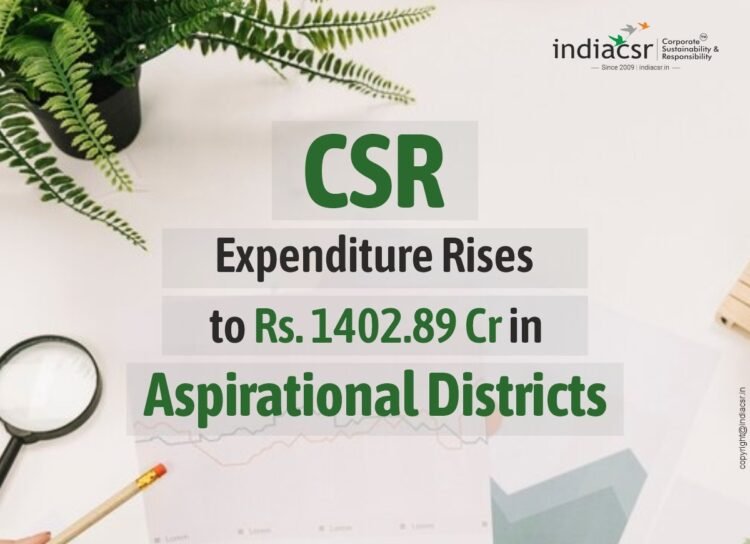NEW DELHI (India CSR): The Corporate Social Responsibility (CSR) expenditure in India’s Aspirational Districts has shown significant growth over the last three financial years. According to the latest data, CSR spending increased from Rs. 651.43 crore in FY 2020-21 to Rs. 1402.89 crore in FY 2022-23. This steady rise reflects the growing commitment of companies toward equitable and sustainable development in these underprivileged regions.
The details were shared in a written reply by Harsh Malhotra, Minister of State for Corporate Affairs and Road Transport and Highways, in the Lok Sabha.
1. Understanding Aspirational Districts
The Aspirational Districts Programme was launched in January 2018 by the Government of India to uplift the socio-economic status of 112 backward districts. These districts were identified based on their poor performance in key development indicators such as health, education, agriculture, water resources, financial inclusion, and infrastructure.
The aim is to bring transformative change by fostering collaboration among the government, private companies, and NGOs. CSR funds play a crucial role in bridging development gaps in these districts.
2. Steady Growth in CSR Spending
CSR expenditure in these districts has shown consistent growth over the last three financial years:
| Financial Year | CSR Expenditure (Rs. Cr) | Growth (%) |
|---|---|---|
| 2020-21 | 651.43 | 0.00% |
| 2021-22 | 1046.43 | 60.64% |
| 2022-23 | 1402.89 | 34.06% |
This reflects a 115% increase in CSR spending over three years. Companies are increasingly directing their CSR funds to improve healthcare, education, and rural infrastructure in these underserved areas.
3. Legal Framework Supporting CSR
CSR obligations for Indian companies are governed under Section 135 of the Companies Act, 2013. According to the Act, companies with a turnover exceeding Rs. 1,000 crore, a net worth of Rs. 500 crore, or a net profit of Rs. 5 crore must allocate at least 2% of their average net profit toward CSR activities.
These activities must align with Schedule VII of the Act, which includes areas such as:
- Eradicating hunger and poverty
- Promoting education and gender equality
- Rural development
- Environmental sustainability
- Health care and sanitation
4. The Role of CSR in Transforming Aspirational Districts
CSR funds have been instrumental in addressing gaps in essential services in Aspirational Districts. Companies have increasingly directed their resources toward:
- Healthcare: CSR initiatives have supported mobile health clinics, immunization drives, and infrastructure development in rural hospitals.
- Education: Efforts to improve school infrastructure, digital classrooms, and skill development programs have expanded educational opportunities.
- Rural Development: Projects promoting water conservation, renewable energy, and agriculture have strengthened the rural economy.
- Women Empowerment: Initiatives providing vocational training and financial support have empowered women in these backward regions.
The Aspirational Districts Programme relies heavily on a public-private partnership model. The government sets development goals while companies and CSR partners align their resources to achieve them.
Harsh Malhotra emphasized that the consistent growth in CSR spending reflects increased corporate participation and improved compliance with CSR policies.
“The steady rise in CSR expenditure, reaching Rs. 1402.89 crore in FY 2022-23, is a testament to the transformative power of Corporate Social Responsibility. It reflects the corporate sector’s growing commitment to bridging socio-economic gaps in Aspirational Districts. By investing in healthcare, education, and rural development, companies are not just fulfilling legal mandates but actively contributing to inclusive and sustainable growth. CSR is becoming a driving force in building a more equitable and empowered India.”
— Rusen Kumar, Founder of India CSR.
5. Why CSR in Aspirational Districts Matters
Aspirational Districts are often neglected due to limited resources and infrastructure. CSR investments ensure:
- Inclusive growth by addressing regional imbalances.
- Improved quality of life through better access to healthcare, education, and employment.
- Economic empowerment of local communities through sustainable projects.
By focusing on these backward districts, CSR becomes a tool for nation-building and social equity.
6. The Road Ahead
The upward trend in CSR spending highlights a promising future for India’s Aspirational Districts. However, continued collaboration, efficient resource allocation, and innovative CSR strategies are crucial to sustaining this momentum.
With over Rs. 1402.89 crore invested in FY 2022-23, CSR is emerging as a transformative force, driving development in the most underprivileged regions of the country. The program’s success will depend on ongoing corporate participation and a shared vision of inclusive growth.
7. You Learn
The increase in CSR expenditure from Rs. 651.43 crore to Rs. 1402.89 crore over three years is a testament to the corporate sector’s commitment to societal development. Through targeted investments and focused efforts, Aspirational Districts are witnessing meaningful progress, paving the way for a brighter and more equitable future.
(India CSR)
इसे हिंदी में भी पढ़ें: अस्पिरेशनल जिलों में CSR व्यय में वृद्धि: FY 2022-23 में 1402.89 करोड़ रुपये का निवेश







